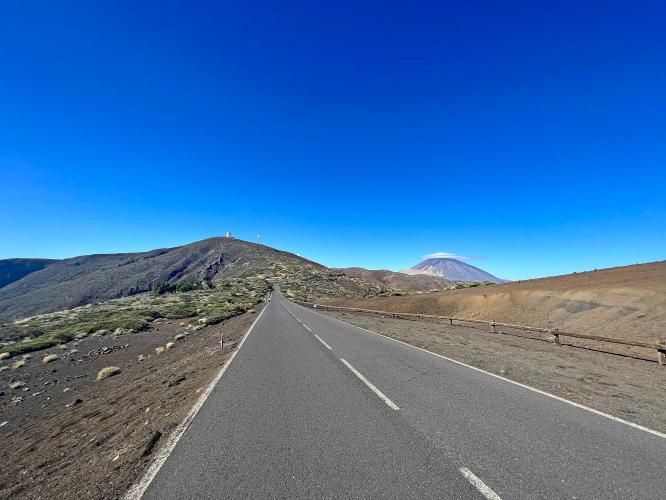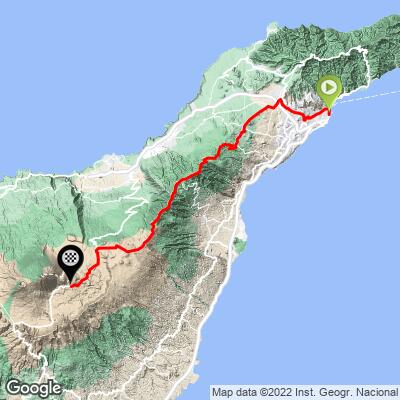![Mount Teide from Santa Cruz de Tenerife, Spain panoramic view of Mt. Teide from Santa Cruz]()
Cycling the longest bike climb in Europe - Mount Teide from Santa Cruz de Tenerife
Ride 62.5 kilometers gaining 2,827 meters at 3.7% average grade (6.3% climb only).
See also the PJAMM Adventure App link for our Tenerife Cycling Adventure (see bottom of page for more details).
![Mount Teide from Santa Cruz de Tenerife, Spain photo collage shows views of Mt. Teide, signs for El Portillo and El Teide]()
SIX POPULAR ROUTES UP MOUNT TEIDE
![Mount Teide from Santa Cruz de Tenerife, Spain PJAMM Cycling map highlighting six of the most popular routes up Mt. Teide]()
PJAMM Google Map with six of the most popular routes up Mount Teide.
The routes in counterclockwise order beginning with Mount Teide in El Medano (Southeast):
- El Medano: 38.3 kilometers gaining 2,289m at 5.7% average grade ending at the park sign on TF-21
- Los Cristianos: 33.2 kilometers gaining 2,109m at 6.4% ending at the park sign on TF-21
- Los Gigantes: 36.6 kilometers gaining 2,068m at 5.6% ending at highpoint on TF-38
- Puerto de la Cruz: 47 kilometers gaining 2,429m at 5% ending at the highpoint on TF-21
- Santa Cruz de Tenerife: 62.5 kilometers (longest climb in Europe) gaining 2,827m at 3.7% ending at TF-21 highpoint
- Guimar: Ride 48.9 kilometers gaining 2,508m at 4.4% ending at the highpoint on TF-21
THE RIDE FROM TENERIFE’S CAPITAL
This route from Tenerife’s busy capital of Santa Cruz is the longest road bike climb in Europe (world #10) and arguably the most scenic route up to Mount Teide. Since there are several descents along this climb, it is not the longest “continuous” uphill climb in Europe, but it is the longest climb up a single mountain.
![Mount Teide from Santa Cruz de Tenerife, Spain photo collage shows alpine forest views, views looking down over the foggy mountains from above]()
After suffering 19.3 kilometers through a crowded urban setting we break free for good, into dense alpine forest that continues for 22 kilometers before hitting Mount Teide’s volcanic moonscape.
![Mount Teide from Santa Cruz de Tenerife, Spain lookout point: Mirador de Ortuño]()
Mirador de Ortuño - high above the clouds -
View of Mount Teide at the 30.8 kilometer mark - just about half-way up the climb.
![Mount Teide from Santa Cruz de Tenerife, Spain photo collage shows views from Teide Parque National, two-lane highway roadway, informational signs, desert-like setting]()
We ride into and through one of Spain’s most popular national parks - Teide Parque National.
This is a UNESCO World Heritage Site and is one of the 12 Treasures of Spain.
“Teide National Park - Situated on the island of Tenerife, Teide National Park features the Teide-Pico Viejo stratovolcano that, at 3,718 m, is the highest peak on Spanish soil. Rising 7,500 m above the ocean floor, it is regarded as the world’s third-tallest volcanic structure and stands in a spectacular environment. The visual impact of the site is all the greater due to atmospheric conditions that create constantly changing textures and tones in the landscape and a ‘sea of clouds’ that forms a visually impressive backdrop to the mountain. Teide is of global importance in providing evidence of the geological processes that underpin the evolution of oceanic islands” (UNESCO - Teide National Park).
![Mount Teide from Santa Cruz de Tenerife, Spain photo collage shows observatories and informational signs]()
Turn left at kilometer 48.6 for a short detour to the observatories.
![]()
There are about 12 observatories along TF-24 13.5 kilometers from the finish.
Teide Observatory is a group of about 19 solar, nocturnal, and radio telescopes located on the northeastern portion of Teide National Park. This facility opened in 1964 and was one of the world’s largest international observatory operations. Later, observatory priority shifted to Roques de los Muchachos which now hosts the largest telescope in the world (see PJAMM’s Roques de los Muchachos climb page). There is a visitor center, but you must sign up for a tour in advance - you cannot just drive up to the telescopes - there is a gate and guardhouse blocking the road at the bottom.
![]()
From the home page for the Teide Observatory:
“Experience the scientific side of Tenerife with a Teide Observatory visit
There’s so much more to Tenerife than the sun and the beach. Inland, almost half of the island lies within the Canary Islands’ Network of Protected Natural Spaces, and a good proportion also belongs to the Natura 2000 Network, which aims to ensure the long-term survival of Europe’s most threatened species and habitats. That may give you a clue as to the environmental importance and richness of Tenerife. The island holds several international awards from UNESCO to attest to its natural and cultural wealth. The Teide National Park has been declared a World Heritage Site, as has the city of San Cristóbal de La Laguna, while the Macizo de Anaga is a World Biosphere Reserve” (Read more or buy tickets).
![Mount Teide from Santa Cruz de Tenerife, Spain photo collage shows high desert and alpine setting along the two-lane highway roadway of the Mt. Teide from Santa Cruz climb]()
![Mount Teide from Santa Cruz de Tenerife, Spain view looking back over the roadway with cloud topped Mt. Teide in distance.]()
![Mount Teide from Santa Cruz de Tenerife, Spain photo collage shows intersection and roadsigns for El Teide, Boca Tauce]()
Turn left onto TF-21 at kilometer 55 after a 6.1 kilometer -4.3% descent.
![Mount Teide from Santa Cruz de Tenerife, Spain panoramic view shows the El Teide caldera]()
The Teide caldera and the final kilometers of TF-21 to the finish.
![Mount Teide from Santa Cruz de Tenerife, Spain bike parked next to large stone monument, Minas de San Jose]()
Minas de San Jose at kilometer 60.5 just before the finish.
![Mount Teide from Santa Cruz de Tenerife, Spain climb finish at Lomo Tiesco, the highest paved point on the island]()
Finish at the highest paved point on Tenerife.
This is also Montaña Blanca and the trailhead for the hike of 8.3 kilometers (5.16 miles one way) gaining an incredible 1,188 meters (3,897’) to Mount Teide Peak. You can see the hike on our interactive map from our PJAMM Adventure App. Note: To hike to Mount Teide summit you must have a permit (apply here). The Teide Cable Car parking lot is just past the finish of our climb - Google Map of Teide Cable Car. With a cable car ticket, one can hike to the top and ride the cable car down, but you’ll have to hike 2.3 kilometers back to the trailhead if you don’t have a ride at the bottom of the cable car.
![Mount Teide from Santa Cruz de Tenerife, Spain view of Mt. Teide from the Izana viewpoint]()
We feel this route has the best views of Mount Teide of any other approach.
![Mount Teide from Santa Cruz de Tenerife, Spain photo collage shows views of cloud-capped Mt. Tiede approaching in distance from climb]()
The Teide volcano is the highest mountain in Spain and the highest volcano in the Atlantic Ocean. It is also the third highest volcano in the world from its base in the ocean floor.
FINISH TO VISITOR CENTER
![Mount Teide from Santa Cruz de Tenerife, Spain panoramic view of craggy, rocky mountains in distance, scrub brush in foreground]()
Six kilometers from the finish to the Visitor Center; 2.3 kilometers to the Mount Teide Tram.
![Mount Teide from Santa Cruz de Tenerife, Spain PJAMM Cyclist riding on two-lane highway roadway with Mt. Teide in background]()
The trip from the high point to the Visitor Center is generally downhill.
VISITOR CENTER
![Mount Teide from Santa Cruz de Tenerife, Spain photo collage shows views inside and outside of Teide Visitor Center]()
Food, beverages, bathroom, and extraordinary views from the VC.
![Mount Teide from Santa Cruz de Tenerife, Spain photo collage shows monument outside of visitor's center]()
We encounter several climate zones and ecosystems along the climb. We ride from the ocean, through alpine forest, into a transition segment with lower vegetation and broom scrub, to the stark volcanic landscape after the park sign on the way to the high point of the TF-21 and any road on Tenerife.
“The plant world is another of the outstanding features of the Mt. Teide National Park, where plant species are fully adapted to the tough living conditions of high altitude, intense sunlight, extreme temperature variations and lack of moisture. The vegetation has colonized this world of lava step by step, putting down roots in the almost inexistent, but nutrient and mineral rich soil, where lichens usually form the only vegetation cover of non-vascular flora that covers the recent lava flows of the Park. Hence, the diversity of plant species in the Mt. Teide National Park has a striking wealth, including an abundance of species that are endemic either to the island, regionally or even locally endemic.” (Wonderfultenerife.com, flora and fauna of Mount Teide).
TRAM
![Mount Teide from Santa Cruz de Tenerife, Spain photo collage shows tram up Mt. Teide]()
The tram is accessed 2.3 kilometers past the finish of this climb. The tram will take you to near the top of Mount Teide. If you wish to hike to the highest point in Spain, get those tickets well in advance of your trip - we were told two months at the information booth in October 2022 (Official Website). Because of an unseasonal rainstorm the tram was not running during our trip.
![Mount Teide from Santa Cruz de Tenerife, Spain informational signs for the tram up Mt. Teide]()
![Mount Teide from Santa Cruz de Tenerife, Spain view of snow-covered Mt. Teide in March]()
Wintery conditions on Mount Teide in March.
![Mount Teide from Santa Cruz de Tenerife, Spain photo collage shows PJAMM Cyclists with Tenerife Cycling Tours]()
Bike Point - five locations on Tenerife.
Center Photo - Alberto Delgado (center) - Tenerife Cycling Tours - HIGHLY recommended!
Bike rentals on Tenerife can be obtained via: (a) Bike Point (five locations), and (b) Free Motion which has Specialized, Cannondale, and Pinarello rentals and is endorsed by our cycling friend Bo Jensen, who has significant experience cycling the Canary Islands.
![Mount Teide from Santa Cruz de Tenerife, Spain photo collage of Paradores hotel]()
Paradores are Spanish government owned luxury hotels. The Parador on Tenerife is located at the Visitor Center and is the best location to stay, albeit pricey, for cycling the many routes up to Mount Teide. The professionals stay here because it also provides altitude acclimation (situated at 2,100 meters). The cost of Parador de Las Canadas del Teide was about twice the cost of our Vilaflor hotel (Villalba Hotel Spa; 85 versus 160 euros).
If you are curious about our trips and our itinerary and climbs, or want to use the PJAMM Travel App to share your trip, track others on your trip, navigate to and from points of interest and climbs, create an itinerary. Here’s a template for you: PJAMM Adventure App - Tenerife and La Palma. We have created preloaded Trip Pages for over 50 of our favorite, most exciting, epic, and scenic adventures which can be viewed and accessed at pjammadventures.com.

 We've partnered with Sherpa-Map.com to bring you the best route planning tool. With a PRO Membership you can use this climb as a reference when creating your route.
We've partnered with Sherpa-Map.com to bring you the best route planning tool. With a PRO Membership you can use this climb as a reference when creating your route. 

